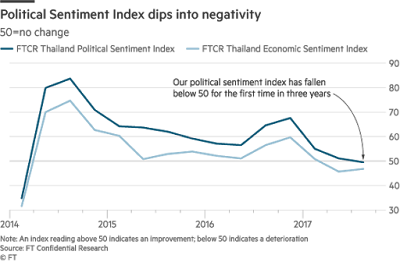
สื่อนอกสำรวจพบ 'คนไทย' ไม่พอใจรัฐบาลเพิ่มขึ้น
By กองบรรณาธิการ ข่าวต่างประเทศ
Voice TV
7 พฤศจิกายน 2560
หน่วยวิจัยไฟแนนเชียลไทมส์เผยผลสำรวจไตรมาสสาม พบคนไทยมองอนาคตการเมืองเลวลง ไม่พอใจ ‘รัฐบาลประยุทธ์’ เพิ่มขึ้น น้อยคนเชื่อมั่นคำสัญญาจัดเลือกตั้งในปี 2561
เว็บไซต์หนังสือพิมพ์ นิกเกอิ เอเชียน รีวิว เผยแพร่ผลสำรวจของหน่วยวิจัยของไฟแนนเชียลไทมส์ FT Confidential Research ระบุว่า ความคาดหมายของคนไทยต่อสถานการณ์การเมืองตกต่ำย่ำแย่กว่าช่วงเวลาใดนับแต่กองทัพไทยยึดอำนาจเมื่อปี 2557
นอกจากนี้ คนไทยส่วนใหญ่เชื่อว่า การเมืองจะยังไม่ดีขึ้นในช่วงเวลา 6 เดือนข้างหน้า และมองว่าการเลือกตั้งคงเลื่อนออกไปเป็นปี 2562 เป็นอย่างเร็ว
การสำรวจทัศนคติของคนไทยต่อสถานการณ์การเมืองในไตรมาสสามฉบับนี้ สอบถามความเห็นของประชาชนจำนวน 1,000 คนเมื่อช่วงก่อนหน้าวันที่ 10 ตุลาคมเล็กน้อย ซึ่งเป็นวันที่รัฐบาลทหารให้คำมั่นสัญญาว่าจะจัดการเลือกตั้งในช่วงปลายปี 2561
เมื่อถามว่า พอใจรัฐบาลหรือไม่ ผู้ตอบร้อยละ 29.4 บอกว่า ไม่พอใจ ขณะร้อยละ 24 บอกว่า พอใจ ทั้งนี้ เมื่อไตรมาสก่อน คนที่พอใจมีมากกว่าคนที่ไม่พอใจเล็กน้อย
ผลสำรวจพบด้วยว่า คนไทยมองสถานการณ์การเมืองไปในทางลบค่อนไปในแดนต่ำกว่า 50 เป็นครั้งแรกในช่วงเวลาสามปีครึ่ง กล่าวคือ ลดจาก 51.1 ในการสำรวจครั้งที่แล้วลงมาอยู่ที่ 49.5
สำหรับสถานการณ์ทางเศรษฐกิจ ความรู้สึกของคนไทยตกลงไปในแดนต่ำกว่า 50 ตลอดสองไตรมาสที่ผ่านมา แม้เศรษฐกิจกระเตื้องขึ้นเพราะการส่งออก ทว่าประเทศไทยยังมีอัตราเติบโตเป็นที่โหล่ในเอเชียตะวันออกเฉียงใต้ ประกอบกับผู้ใช้แรงงานและคนชั้นกลางรู้สึกขัดสนเนื่องจากรายได้เพิ่มขึ้นช้า แต่หนี้ครัวเรือนสูงขึ้น
ในเรื่องการเลือกตั้ง ผลสำรวจพบว่า คนไทยที่เชื่อว่าจะมีการเลือกตั้งในปี 2561 มีเพียงร้อยละ 38 ขณะจำนวนใกล้เคียงกันเชื่อว่าจะมีขึ้นในปี 2563 หรือล่าช้ากว่านั้นอีก.
Photo: AFP
ooo
เรื่องเกี่ยวข้อง...
FT Confidential Research
Political fatigue wears on Thai consumers
Election, economy damp political sentiment as one-year royal mourning period ends

Thai people dressed in black in honor of the late King Bhumibol Adulyadej sit at tables at the food court of a shopping mall in Bangkok, Thailand. © AP
หน่วยวิจัยไฟแนนเชียลไทมส์เผยผลสำรวจไตรมาสสาม พบคนไทยมองอนาคตการเมืองเลวลง ไม่พอใจ ‘รัฐบาลประยุทธ์’ เพิ่มขึ้น น้อยคนเชื่อมั่นคำสัญญาจัดเลือกตั้งในปี 2561
เว็บไซต์หนังสือพิมพ์ นิกเกอิ เอเชียน รีวิว เผยแพร่ผลสำรวจของหน่วยวิจัยของไฟแนนเชียลไทมส์ FT Confidential Research ระบุว่า ความคาดหมายของคนไทยต่อสถานการณ์การเมืองตกต่ำย่ำแย่กว่าช่วงเวลาใดนับแต่กองทัพไทยยึดอำนาจเมื่อปี 2557
นอกจากนี้ คนไทยส่วนใหญ่เชื่อว่า การเมืองจะยังไม่ดีขึ้นในช่วงเวลา 6 เดือนข้างหน้า และมองว่าการเลือกตั้งคงเลื่อนออกไปเป็นปี 2562 เป็นอย่างเร็ว
การสำรวจทัศนคติของคนไทยต่อสถานการณ์การเมืองในไตรมาสสามฉบับนี้ สอบถามความเห็นของประชาชนจำนวน 1,000 คนเมื่อช่วงก่อนหน้าวันที่ 10 ตุลาคมเล็กน้อย ซึ่งเป็นวันที่รัฐบาลทหารให้คำมั่นสัญญาว่าจะจัดการเลือกตั้งในช่วงปลายปี 2561
เมื่อถามว่า พอใจรัฐบาลหรือไม่ ผู้ตอบร้อยละ 29.4 บอกว่า ไม่พอใจ ขณะร้อยละ 24 บอกว่า พอใจ ทั้งนี้ เมื่อไตรมาสก่อน คนที่พอใจมีมากกว่าคนที่ไม่พอใจเล็กน้อย
ผลสำรวจพบด้วยว่า คนไทยมองสถานการณ์การเมืองไปในทางลบค่อนไปในแดนต่ำกว่า 50 เป็นครั้งแรกในช่วงเวลาสามปีครึ่ง กล่าวคือ ลดจาก 51.1 ในการสำรวจครั้งที่แล้วลงมาอยู่ที่ 49.5
สำหรับสถานการณ์ทางเศรษฐกิจ ความรู้สึกของคนไทยตกลงไปในแดนต่ำกว่า 50 ตลอดสองไตรมาสที่ผ่านมา แม้เศรษฐกิจกระเตื้องขึ้นเพราะการส่งออก ทว่าประเทศไทยยังมีอัตราเติบโตเป็นที่โหล่ในเอเชียตะวันออกเฉียงใต้ ประกอบกับผู้ใช้แรงงานและคนชั้นกลางรู้สึกขัดสนเนื่องจากรายได้เพิ่มขึ้นช้า แต่หนี้ครัวเรือนสูงขึ้น
ในเรื่องการเลือกตั้ง ผลสำรวจพบว่า คนไทยที่เชื่อว่าจะมีการเลือกตั้งในปี 2561 มีเพียงร้อยละ 38 ขณะจำนวนใกล้เคียงกันเชื่อว่าจะมีขึ้นในปี 2563 หรือล่าช้ากว่านั้นอีก.
Photo: AFP
ooo
เรื่องเกี่ยวข้อง...
FT Confidential Research
Political fatigue wears on Thai consumers
Election, economy damp political sentiment as one-year royal mourning period ends

Thai people dressed in black in honor of the late King Bhumibol Adulyadej sit at tables at the food court of a shopping mall in Bangkok, Thailand. © AP
November 7, 2017
Source: Nikkei Asian Review
The one-year mourning period for the late King Bhumibol Adulyadej drew to an end last week with an elaborate five-day cremation ceremony. Meanwhile, the latest consumer survey from FTCR indicated Thais are now more pessimistic about politics than at any point since the military seized power in May 2014.
Most responses to our survey were collected shortly before October 10, when the junta reiterated its promise for a November 2018 election. Nevertheless, the military government has for months pointed to late 2018 as the likely timeframe. Yet Prime Minister Prayuth Chan-ocha has sent many mixed signals. During his visit to the White House in early October, he appeared to promise the election would be held in late 2018, only to backtrack days later to say the date would be announced in November 2018 (implying the vote would actually occur around April 2019). But shortly after this, the government reiterated its plan to hold the election in November 2018.
In our third-quarter poll of 1,000 Thai consumers, 42.5 per cent of respondents rate the political situation as "bad" or "very bad" (see chart). This is the highest total since we began asking this question in 2015, and more than double the 20.6 per cent of respondents who rate the situation "good" or "very good".
- An FTCR survey showed that Thais are more pessimistic about the current political situation than at any time since the military took power in May 2014.
- Our research also showed that Thais think the political environment is unlikely to improve over the next six months.
- Most respondents believed the election, now promised for November 2018, will slip to 2019 or later.
The one-year mourning period for the late King Bhumibol Adulyadej drew to an end last week with an elaborate five-day cremation ceremony. Meanwhile, the latest consumer survey from FTCR indicated Thais are now more pessimistic about politics than at any point since the military seized power in May 2014.
Most responses to our survey were collected shortly before October 10, when the junta reiterated its promise for a November 2018 election. Nevertheless, the military government has for months pointed to late 2018 as the likely timeframe. Yet Prime Minister Prayuth Chan-ocha has sent many mixed signals. During his visit to the White House in early October, he appeared to promise the election would be held in late 2018, only to backtrack days later to say the date would be announced in November 2018 (implying the vote would actually occur around April 2019). But shortly after this, the government reiterated its plan to hold the election in November 2018.
In our third-quarter poll of 1,000 Thai consumers, 42.5 per cent of respondents rate the political situation as "bad" or "very bad" (see chart). This is the highest total since we began asking this question in 2015, and more than double the 20.6 per cent of respondents who rate the situation "good" or "very good".

When asked whether they are happy with the current government, respondents indicated a similar shift toward negative sentiment: 29.4 per cent said they were "somewhat" or "very unhappy", compared with 24 per cent who answered "somewhat" or "very happy" (see chart). In the previous survey, slightly more respondents said they were happy with the government than said they were unhappy.

Meanwhile, our forward-looking Political Sentiment Index for Thailand fell to 49.5 from 51.1 in the previous quarter, dipping below 50 into pessimistic territory for the first time in three and a half years (see chart).

Concerns about the economy also damped the consumer mood. Political sentiment closely tracks our Economic Sentiment Index, which has dropped below 50 for the past two quarters. Although the economy has improved under the junta, largely thanks to a rally in exports, Thailand continues to underperform the other Asean nations and many working and middle-class Thais feel squeezed by slow income growth and high household debt.
Election uncertainty looms
Uncertainty about the next election looms over the political outlook, and Thai respondents expressed scepticism about the timeline. According to our third-quarter survey, just 38 per cent believed the poll would indeed take place in 2018, while almost as many believed it would be delayed until 2020 or beyond (see chart).

We expect that a firmly scheduled (and believable) election date will spark a rebound in political sentiment. Given Thailand's deeply divided electorate and history of election-related unrest, an impending general election would typically increase short-term political risks and probably cause sentiment to deteriorate. However, in this case, the handover to a civilian government after more than four years of military rule will mark a return to relative normalcy, and we predict a collective sigh of relief - assuming the election goes smoothly and the results are respected by the losers.
Any definite legal or logistical steps toward the election will send positive signals. Importantly, the junta should pass the remaining two of the so-called "organic laws" governing elections and political parties. The draft versions of these are expected to be submitted in late November to the National Legislative Assembly, which will have 120 days (60 days for each) to review and enact them. With these laws passed, the election date can be set around March or April, sufficiently ahead of the November 2018 timeframe. On the other hand, if the organic laws are rejected or their review is delayed, the vote would probably slip to 2019.
Another important signpost will be the lifting of the ban on political activities, a necessary step if parties and candidates are to be able to campaign and discuss their platforms. Prawit Wongsuwan, the deputy prime minister, confirmed on October 30 that the prohibition remains in effect until further notice. The Election Commission must also be filled with new permanent members to replace the stand-in body.
This article was first published on October 31 by FT Confidential Research.
FT Confidential Research is an independent research service from the Financial Times, providing in-depth analysis of and statistical insight into China and Southeast Asia. A team of researchers in these key markets combine findings from proprietary surveys with on-the-ground research to provide predictive analysis for investors.



.jpg)



